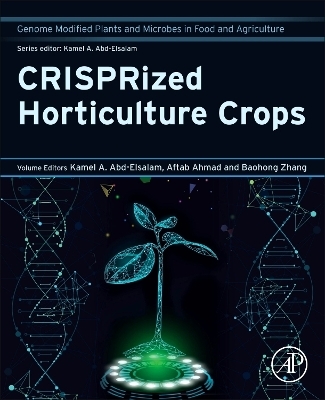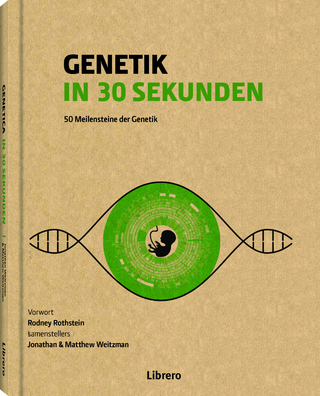
CRISPRized Horticulture Crops
Academic Press Inc (Verlag)
978-0-443-13229-2 (ISBN)
Horticultural crops, including fruit, vegetable and ornamental plants are an important component of agriculture production systems and play an important role in sustaining human life.
Prof. Kamel A. Abd-Elsalam, Ph.D., is currently a research professor at the Plant Pathology Research Institute, Agricultural Research Center, Giza. Kamel earned his Ph.D. in Molecular Plant Pathology from Christian Alberchts University of Kiel (Germany) and Suez Canal University (Egypt). Dr. Kamel’s research interests include developing, improving, and deploying plant biosecurity diagnostic tools; understanding and exploiting fungal pathogen genomes; and developing eco-friendly hybrid nanomaterials for controlling toxicogenic fungi, plant diseases, and agroecosystems applications. He published 20 books related to nano-biotechnology applications in agriculture and plant protection. Since 2019, he has served as the Editor-in-Chief of the Elsevier book series “Nanobiotechnology for Plant Protection. He also serves as the Series Editor of the Elsevier book series “Genome Modified Plants and Microbes in Food and Agriculture. Dr Aftab Ahmad is currently working as Assistant Professor at Department of Biochemistry/ US-Pakistan Center for Advanced Studies in Agriculture and Food Security (CAS-AFS), University of Agriculture, Faisalabad (UAF), Pakistan. Dr Aftab’s research interests include developing virus resistant and salt tolerant plants using CRISPR/Cas technology. He has published more than 15 research articles in international peer reviewed journals including Journal of Biomedical Sciences, Scientific Reports-Nature, PLOS One, Journal of Translational Medicine, Plant Molecular Biology Reporter, Molecules, Journal of Cereal Science, and Genetic Resources and Crop Evolution. Dr Aftab pursued his PhD and postdocs in Plant Molecular Biology from University of Shizuoka, Japan under Center of Excellence (COE, 21st Century) program. Dr Aftab also served as visiting scientist in department of plant sciences, University of California, Davis, USA. Dr Aftab has been teaching biochemistry and molecular biology at UAF and his research focuses in the area of CRISPR/Cas based genome editing in plants. Dr. Baohong Zhang is a full Professor at East Carolina University. His major research interest is on plant genetics and genomics with a focus on epigenetics and small RNA regulation. Dr. Zhang has developed a somatic embryogenesis and plant regeneration system for cotton tissue culture and transgenics; based on this, he also developed a system for CRISPR/Cas9 genome editing in cotton. He has published more than 200 papers with more than 9000 citations. During the past 20 years of his research and teaching, Dr. Zhang has been promoting genomics and biotechnology through research and education for a diversity of people. He has served on a various editorial boards of international journals and served as reviewers for more than 100 peer-reviewed journals as well as review panels for more than 30 national and international funding agencies. Dr. Zhang has delivered many keynote and/or invited lectures at different institutes and international conferences.
Part 1: The CRISPR/Cas toolkit for Horticultural Crops 1. Horticultural Crops: Genomic Approaches: A note from Editors 2. Evolution of genome editing technologies 3. CRISPR / Cas: Effectors, mechanism, and classification 4. Bioinformatics tools and databases in genome editing for plants 5. Genome editing reagents and their delivery tools 6. CRISPR Techniques and their applications in plants 7. Base editing and Prime Editing in Horticulture Crops: Potential Applications, Challenges and Prospects 8. Multiplex Genome Editing in plants through CRISPR/Cas 9. CRISPR Edited Crops: The Future of Food and environment Sustainability
Part 2: CRISPR Mediated Genome Editing in Horticultural Crops 10. The CRISPRized Horticultural Crops: How they can transform our food supply 11. Precision breeding techniques for horticultural crops 12. Deep learning for genomics and epi-genomics in horticulture crops improvement 13. Transformation methods in horticulture crops and DNA free genome editing in plants 14. CRISPR vegetables: Challenges and opportunities 15. CRISPR–Cas9-mediated genome editing in tomato, and Potato 16. A CRISPR/Cas Based Improvement of Root and Tuber crops 17. Improvement of ornamental?plants through CRISPR/Cas 18. CRISPR approaches for synthetic biology and metabolic engineering in vegetables and fruits 19. CRISPR Cas systems for the improvement of Solanaceous vegetable crops 20. Engineering biotic stress resistance in horticultural plants through CRISPR/Cas 21. Genome editing for abiotic stress resistance in horticultural crops 22. CRISPR/Cas technology for enhancement Genetic Amelioration of Fruits in horticulture crops 23. CRISPR–Cas9-mediated genome editing in Banana, apple and grapevine 24. CRISPR Applications in Medicinal plants 25. CRISPR Edited Floriculture Crops: A Revolutionary Technique to Improve Flower Production, their Color and Longevity 26. CRISPR based improvement of Grasses in horticulture 27. CRISPR genome editing of woody trees: current status and future Trends
Part 3: Regulation and Commercialization of CRISPR edited crops 28. Regulatory, ethical, social, and biosafety concerns in genome edited horticultural crops 29. Social, Ethical and Policy issues in CRISPR Edited Crops 30. Commercialization of CRISPR edited crops: Opportunities and Challenges 31. Global Patent Landscape in CRISPR/Cas
| Erscheinungsdatum | 03.04.2024 |
|---|---|
| Verlagsort | San Diego |
| Sprache | englisch |
| Maße | 216 x 276 mm |
| Gewicht | 450 g |
| Themenwelt | Naturwissenschaften ► Biologie ► Genetik / Molekularbiologie |
| Technik ► Umwelttechnik / Biotechnologie | |
| Weitere Fachgebiete ► Land- / Forstwirtschaft / Fischerei | |
| ISBN-10 | 0-443-13229-1 / 0443132291 |
| ISBN-13 | 978-0-443-13229-2 / 9780443132292 |
| Zustand | Neuware |
| Haben Sie eine Frage zum Produkt? |
aus dem Bereich


